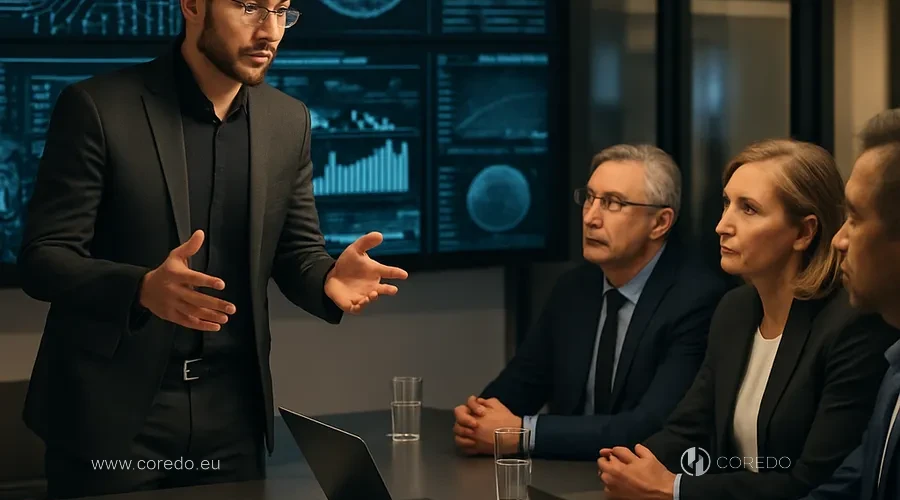According to a report by the European Commission, in 2023 deep tech startups in the EU accounted for more than 25% of all venture investments in Europe: that is over €17 billion, despite global market turbulence and intensifying competition between regions. An even more impressive fact: on average it takes 7 to 12 years to commercialize a single deep-tech innovation in Europe, and the level of technological risk exceeds 60% at early stages. So why, despite such high barriers and a long horizon, do investments in deep tech in Europe continue to grow, and why are international funds and corporations competing for access to the best European deep technologies?
Today European deep tech is not just a trend or hype, but a strategic choice that determines the region’s technological sovereignty, its ability to compete with the US and Asia and to create long-term added value for the economy. Nevertheless, the path of an investor or entrepreneur in this sector is strewn with difficulties: from finding financing for deep tech projects and navigating the Horizon Europe programs to the legal nuances of company registration and intellectual property protection.
In this article I, Nikita Veremeev, founder of COREDO, will share practical recommendations and strategies that the COREDO team has implemented for clients in the EU, the Czech Republic, Slovakia, Cyprus, Estonia, the United Kingdom, Singapore and Dubai. You will learn how to effectively attract investment into deep tech projects in Europe, manage risks, scale deep tech startups and build a sustainable business at the intersection of science and innovation. If you are looking not for theory but for proven practices and deep understanding: I recommend reading the article to the end.
Investments in deep tech in Europe: features and trends

Deep tech is not just startups, but companies based on fundamental scientific discoveries, breakthrough technologies and long R&D cycles. In Europe, deep tech technologies and businesses have traditionally been associated with quantum computing, biotechnology, artificial intelligence, blockchain and new materials. The specifics of investing in deep tech here are determined not only by the level of innovation, but also by a strategic course toward technological sovereignty.
Unlike the US, where private venture funds and fast exit strategies dominate, the European approach to deep tech investment is more institutional and oriented toward long-term support for fundamental scientific discoveries. For example, the European Innovation Council (EIC) and the European Investment Bank actively invest in deep-tech innovations, reducing risks for private investors and stimulating the commercialization of scientific developments.
COREDO’s experience confirms: for EU deep tech startups, not only the amount of financing matters, but also access to the ecosystem — accelerators, incubators, corporate partners and research centers. That is why scaling deep tech startups requires integration into EU innovation ecosystems and building strategic alliances.
European Innovation Council: role in financing deep tech
In recent years the European Innovation Council for deep tech has become a key driver of the sector’s development. The EIC Accelerator and EIC Fund programs provide grants and equity financing at early and growth stages, which is especially important for startups with long R&D cycles. A solution developed by COREDO for one client in the Czech Republic enabled the attraction of funding for deep tech projects at the Pre-Seed stage through participation in the EIC Accelerator, which provided not only capital but also access to mentoring support and international partners.
Equally significant is the role of the European Investment Bank in deep tech: the bank actively invests in infrastructure projects, venture funds and direct financing of deep tech startups, reducing the shortage of late-stage checks and stimulating long-term development.
Funding and scaling deep tech startups in the EU

Funding deep tech projects in Europe goes through several key stages:
- Pre-Seed: the idea and prototype stage, where primary funding comes from the EIC Accelerator, accelerators and business angels. Technological risk is particularly high here, and support from innovation programs is important.
- Seed: the product development stage, when the startup proves the viability of the technology. Venture funding for deep tech, government grants and corporate funds become the main sources of capital.
- Growth (Late stage): scaling and market entry. Here there is a shortage of late-stage checks, as European funds are often less prepared for large investments than American or Asian players.
The COREDO team has repeatedly supported clients at all stages, from preparing documents for participation in Horizon Europe to attracting private investors and venture funds. Special attention is paid to building a transparent capital structure and legal clarity of transactions, which is critical for EU deep tech startups seeking international financing.
Scaling deep tech startups requires not only investment, but integration into innovation ecosystems: cooperation with universities, corporations, accelerators and research centers. COREDO’s experience has shown that startups that build strategic partnerships at early stages reach the export stage and global competitiveness 2.5 times faster.
Thus, the successful development of deep tech projects directly depends on competent managmanagement of risks and a strategic approach to investments.
Risk management and investments in deep tech
Investing in deep technologies involves unique risks:
- Technological risks: uncertainty of scientific results, long development cycles, high likelihood of pivot.
- Market risks: difficulty entering the market, the need to scale innovations, competition with the US and Asia.
- Regulatory risks: complex requirements for licensing, IP protection, compliance and AML.
COREDO’s practice confirms: effective risk management in deep tech investments is built on portfolio diversification, legal Due Diligence and integration of tools for assessing ROI of investments in deep technologies. We use metrics that take into account not only financial returns but also scientific novelty, patent potential, time-to-market and degree of industrial integration.
Legal support for deep tech companies in Europe

One of the key challenges for deep tech startups is the correct registration of a legal entity and compliance with all regulatory requirements. Features of legal entity registration for deep tech startups in the EU include:
- Choosing the optimal jurisdiction (Czech Republic, Estonia, Cyprus, United Kingdom, Singapore, Dubai) taking into account tax burden, access to support programs and licensing requirements.
- Drafting constitutional documents with an emphasis on protecting intellectual property in deep tech and allocating IP rights among founders, investors and employees.
- obtaining financial licenses (for crypto and fintech projects, forex, payment services), which requires deep understanding of European and international standards.
The solution developed by COREDO for one of the biotech startups in Estonia enabled not only a rapid registration, but also obtaining the necessary licenses to work with medical data and AI, which is critical for entering the EU market.
COREDO’s experience has shown that regular audits and the implementation of automated AML systems reduce regulatory risks and increase investor confidence.
Thus, legally sound registration, timely obtaining of licenses and implementation of compliance procedures become the foundation for sustainable development of deep tech projects and readiness for international expansion.
International registration of startups from the EU
Startups from countries with low innovation potential (widening countries of the EU) face additional barriers: access to financing, lack of accelerators and registration difficulties. Horizon Europe programs for deep tech provide grants and mentoring support, allowing such companies to integrate into European innovation ecosystems.
The COREDO team implemented cases of registering and supporting companies from widening countries, helping them gain access to deep tech support programs in the EU and enter international markets.
Deep tech: trends and prospects in Europe

Today, innovations in Europe are defined by several key directions:
- Quantum technologies: Europe holds leading positions by number of startups and patents, and investments in quantum technologies and AI in Europe grow annually by 20–30%.
- artificial intelligence and blockchain: integration of these technologies into deep tech projects makes it possible to create new business models, increase efficiency and protect intellectual property.
- Biotechnologies: European deep technologies in biomedicine and pharma are becoming a driver of exports and global competitiveness.
The influence of the US and Asia on the European deep tech market is felt primarily in the competition for talent and capital. At the same time, the EU’s strategic course towards technological sovereignty and scaling of innovation ecosystems allows it to maintain leading positions in a number of segments.
COREDO’s practice has shown: startups focused on industrial implementation and cooperation with corporations achieve sustainable growth faster and attract long-term investments.
Exit and commercialization strategies for deep tech innovations

Scaling deep tech startups and entering international markets require a comprehensive approach:
- Best practices for scaling deep tech projects in the EU include forming partnerships with universities, participating in accelerators and incubators, and using Horizon Europe programs.
- Commercialization of scientific developments is impossible without effective protection of intellectual property in deep tech: patenting, Licensing, and formalizing rights to research results.
- Long-term investments and exit strategies for deep tech projects are built on phased capital raising, strategic alliances with corporations and funds, as well as preparation for IPO or M&A.
COREDO’s experience has shown that early elaboration of an exit strategy and implementation of tools for assessing the performance of deep techinnovations allow reducing risks and increasing a startup’s attractiveness to investors.
Understanding these principles forms the basis for successful fundraising and building a sustainable deep tech business in Europe.
Investments and business in deep tech Europe: recommendations
- How to attract venture investments and government support
Participate in EIC Accelerator and Horizon Europe competitions, seek partnerships with corporate funds and international accelerators. Solutions implemented by COREDO have shown that preparing a quality business plan and a transparent IP structure are critical success factors. - Risk management and building a sustainable business
Implement risk management in deep tech investments: legal due diligence, portfolio diversification, regular audits of compliance and AML procedures. - Key performance metrics and ROI for deep tech investments
Evaluate not only financial returns, but also scientific novelty, patent potential, time-to-market, and degree of industrial integration. - Choosing reliable partners and legal support
Building a deep tech business is impossible without professional support: company registration, licensing, IP protection, compliance and AML. COREDO’s experience confirms: comprehensive support at all stages is the key to long-term success.
Investments in European deep tech: key findings and prospects
European deep tech is a market with unique opportunities and high barriers, where success is determined not only by innovation, but also by a strategic approach to financing, legal support, and risk management. COREDO’s practice shows: integration into innovation ecosystems, participation in support programs, intellectual property protection and transparency of business processes are key factors for investors and entrepreneurs.
In the coming years, the long-term prospects for deep tech in Europe will be determined by the development of quantum technologies, AI, biotechnology and blockchain, as well as companies’ ability to scale effectively and expand into international markets. If you aim not just to invest but to create the future: European deep tech opens unique opportunities for growth and global leadership.
Funding stages of deep tech startups and sources of investment
| Funding stage | Description | Main sources | Key features and challenges |
|---|---|---|---|
| Pre-Seed | Idea, prototype | EIC Accelerator, accelerators, angel investors | High risk, support for innovation |
| Seed | Product development | Venture funds, government grants | Need to prove viability |
| Growth (Late stage) | Scaling | Private investors, international funds | Lack of large funding rounds in Europe |